College and Career Readiness

Stephanie Reynolds
My name is Stephanie Reynolds. I am a College & Career Counselor who has the privilege of serving students at Walkerton/North Liberty Elementary & Urey Middle School. You can reach me at
MacKenzi Lowry
My name is MacKenzi Lowry. As the academic attendance coach, I provide executive function lessons to 5th and 6th grade students in the classroom and with small groups who did not pass I-STEP the prior school year, as well as check-in with students who have frequent absences. You can reach me at
Whether you want to be a firefighter, a doctor, a teacher or a builder or you don't know, it is never too early to learn about careers. The skills needed and developed at school, are the skills that you will use later in life in your job. The following skills are important for both school and at a job:
Attendance- Come every day.
Punctuality- Be on time.
Teamwork- Work well with others.
Communication- Talk and listen effectively.
Problem Solve- Be able to choose good solutions.
Leadership- Encourage others to do their best and reach their goals.
Your future is in your hands and there is no time like now, to start exploring your options! Here are some tips to prepare for your future:
- Read, Read, Read. Get a library card and visit the library regularly. Read in unusual places like under a tree, in a tent or on the floor. Discuss what you have learned from reading with your adults.
- Have your adults check homework. When checking homework, ask your parents to connect the world of work with the skills being taught in school.
- Play learning games. Play the picture game by selecting a picture with many objects, put the picture away and see who can remember the most objects. Cut out articles and headlines from the paper, mix them up and see who can match the headline to the article, see if you can determine a fact from an opinion, and then discuss the article. Go on a scavenger hunt in your home, list things that are unusual like something from Europe, something round, something very old, and see who can find the most articles on the list.
- Work in teams. Work cooperatively on a family project, sharing what skills are needed, the responsibilities of each person, and the need to work together to complete a task.
- Ask your adults About Their Job. Your adults will probably be thrilled to share with you their job experience. Ask your adults about what skills they use at work and why they chose their career.
- Make the world your classroom. Help your parents figure the tip when you go out to eat, add up your groceries with a calculator, or estimate how many cookies are in a pack. Go to the mall with pencil and pad, look around and then write a short story about what you saw. Look for careers on everyday trips to the church, school or to the park.
 Classroom Career Cluster Lessons
Classroom Career Cluster Lessons
Whether you want to be a firefighter, a doctor, a teacher or a builder or you don't know, it is never too early to learn about careers. The skills needed and developed at school, are the skills that you will use later in life in your job. The following kills are important for both school and on the job:
Attendance- Come every day.
Punctuality- Be on time.
Teamwork- Work well with others.
Communication- Talk and listen effectively.
Problem Solve- Be able to choose good solutions.
Leadership- Encourage others to do their best and reach their goals.
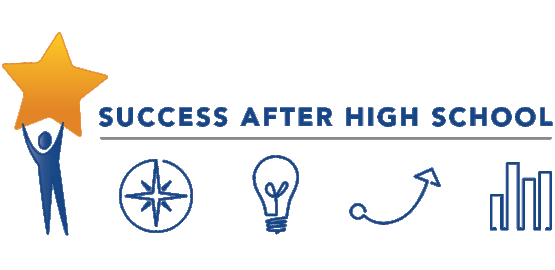
Your future is in your hands and there is no time like now, to start exploring your options!
Here are some tips to prepare for your future:
7th Grade
- Keep a hidden copy of your locker number in your folder, just in case.
- Try to keep your locker organized so you can find what you need easily, without any stress.
- Stay on top of your assignments. Use a planner and your sticker notes on your laptop to track daily assignments/tests/quizzes. Check Harmony every night!
- Study EVERY NIGHT for something...even if you don't have homework due. Read, look over notes, and check over your work.
- Try new things such as a club or a sport. Trying new things will help a student discover their natural gifts, skills, interests AND helps build a student to build a community for themselves.
- Try to eat lunch with friends, but be open to making new friends. Because of new classes, your group of friends may change a bit so try not to take it personal.
8th Grade
- Be sure you understand how high school credits work and how many you are required to take. Find out more about credits before the second semester.
- Explore student organizations, athletics, band, choir and other options that exist for you at high school so you can plan ahead and know how to incorporate them into your schedule.
- Be sure to complete your four-year plan. Ask questions if you don’t understand when meeting with your C&CR counselor.
- Remember, your friends are nervous about high school, too. Stick together, and you’ll find out that high school is not as scary as you once thought.
- Make sure you establish/maintain good study habits this last year of middle school...it will help your transition into high school.
By learning your way around in advance, you’ll feel more confident about high school, and the transition will be a smooth one. Start planning now. Answer the following questions to help you get ready:
- By December 20th (in grade 8), I am going to ask about … (examples: four-year plan, credits, how to locate a map of the school, etc.)
- By April Fool’s Day (in grade 8), I plan to learn about … (examples: orientation, FISH camp, summer camps for math/science, etc.)
- By June 1 (after grade 8), I plan to do the following… (examples: ask an older friend to give me advice about what they wish they had known before high school, introduce myself to a high school counselor, etc.)
For ALL STUDENTS...
- Learn to take a deep breath and try not to stress over the future. Learning to ask for help, seek information whenever it is available, and continuing to learn about yourself will help you make the right choices for your future...YOU GOT THIS! WE BELIEVE IN YOU!!
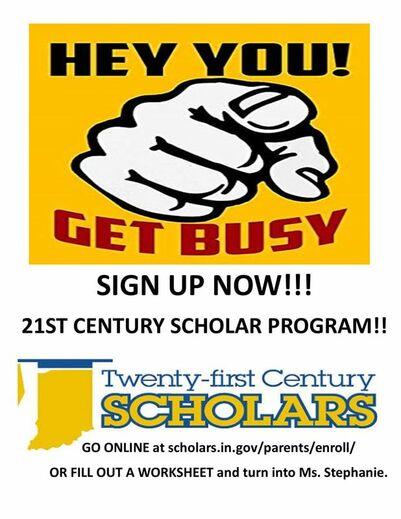
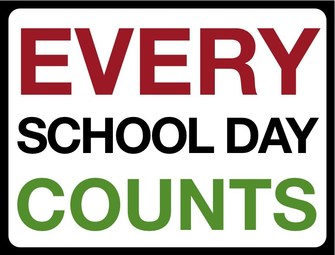
We at NLES/WES want to make sure our students are successful. For us to accomplish this, student attendance must be made a priority. Although teachers are one of the most important school- related factors in a student’s success, they cannot impact or provide learning opportunities when your child is absent. Of course, there will be times when students must miss school, but our goal is to make sure students are only absent when necessary. Just remember, if your child is going to be absent, always call the school by 8:30am so we know that your child is safe.
Did You Know? Being frequently absent early in a child's school career not only shows lower achievement in math, reading, and general knowledge, it is also a common statistic of high school dropouts.
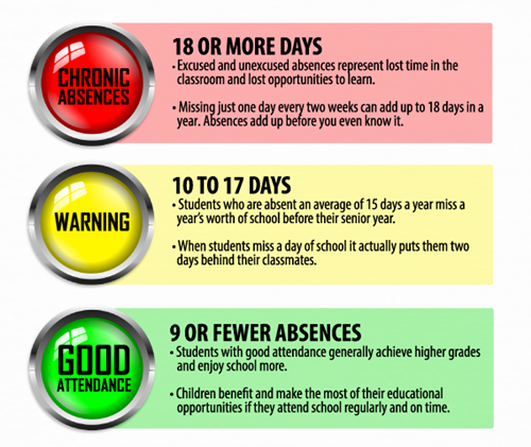
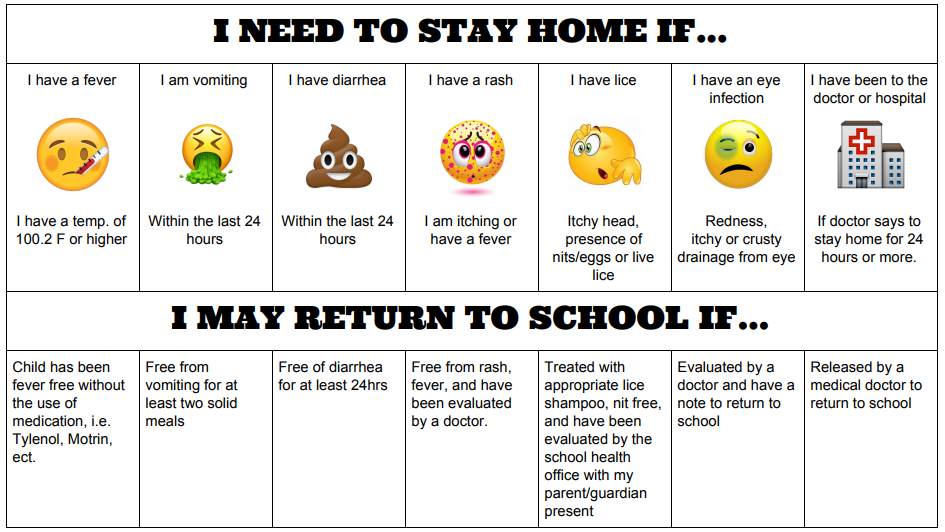
What are Executive Functions?
“Executive functions are the mental processes that enable us to plan, focus attention, remember instructions, and juggle multiple tasks successfully. The brain needs these skill sets to filter distractions, prioritize tasks, set and achieve goals, and control impulses.” We most commonly refer to these skills as life skills. Executive function skills help you manage/accomplish everyday tasks such as getting dressed in the morning, arriving to school/work on time, and even how you address people/situations.
There are three core executive functions: inhibitory control (a cognitive process used to control impulses, thoughts, and behaviors to stimuli through attention and reasoning), working memory (ability to hold information in our minds for a short amount of time in order to accomplish something) , and cognitive flexibility ( the ability to adapt behaviors to changing demands, priorities or perspectives). From these core executive functions come higher order executive functions which include:
- Reasoning
- Organizational
- Goal Setting
- Metacognition
- Initiation
- Sustained attention
- Study strategies
- Test-taking skills
- Self-monitoring
- Time-management/Plannin
Tips to Teach Your Child Time Management
Demonstrate time management skills
Make sure to lead by example, if your student sees you putting an importance on time management, so will they.
Help your students gain an understanding of how to measure time. Time management is a learned process, so children should be taught at a young age how to distinguish time. You can do this by:
- Having students make an estimate of how long they think it will take them to do an everyday task, and then time them completing the task so they know exactly how long it takes them.
- Giving them time estimates based upon something they already know (like TV shows/movies, how long it takes to make food items, sports, familiar trip distances)
- During the day, have your student guess what time it is without looking at the clock, and then have them look at the clock to see how accurate they were.
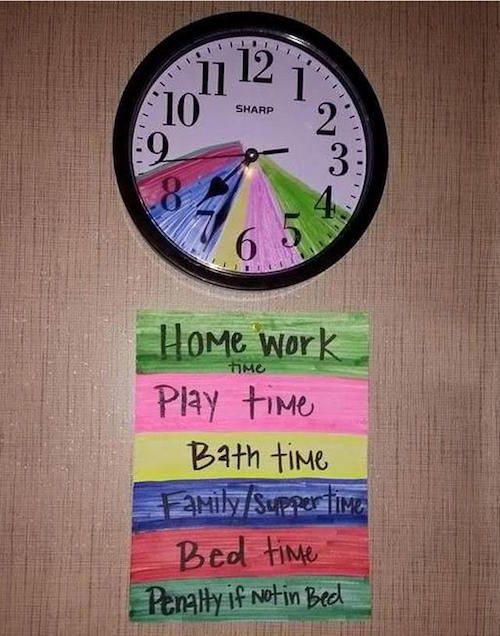
Create a Family Schedule and Calendar Try to establish a family schedule and calendar. This will help your child stay on task at home and prevent you from overscheduling. Also encourage your child to create their daily schedule so it is easier for them to stay on task and manage their time.
You can do this by establishing a regular schedule, and make sure these times are consistent everyday for:
- Dinner time
- Homework time
- Free time
- Bedtime
You can also keep a family calendar that has:
- family commitments
- daily schedules
- extracurricular activities
- days off school/work
- due dates for important assignments/exams major events
Establish a morning and evening routine for the school week.
Have your child write down everything they need to do in the morning/evening, along with the time frame they have to do it in. This will help them stay on task and be more productive.
Example of a MORNING routine:
Time & Task
- 6:00am: I wake up
- 6:05-6:20am: I take a shower
- 6:20-6:30am: I get dressed
- 6:30-6:45am: I brush my teeth/comb hair/take medicine
- 6:45-7:00am: I eat breakfast
- 7:00-7:10am: A little extra spare time, if needed
- 7:10am: I get on the bus or leave for school
Example of an EVENING routine:
Make sure dinner time, homework time, free time, and bedtime are at a consistent time every evening.
Time & Task
- 3:15pm-3:30pm: Arrive home from school
- 3:30-4:30pm: Relax, have a snack, do chores
- 4:30-5:30: Homework/study time: Homework time should be allotted a minimum of 1 hour.
**If your child has no homework this time should be used to study, work ahead on projects, or READ for fun.
- 5:30-6:30: Dinner
- 6:30-7:30: Family time/left over chores/pack up school bag/lunch for next day
- 7:30-8:15: Free time
- 8:15-8:30: Shower (if preferred at night), brush teeth, pick out clothes for next day
- 8:30: Bedtime Children between the ages of (6-12) should get between 9-11 hours of sleep.
**Make sure that electronics are put away when it is time to sleep...even better to have put away an hour before bedtime!
Working Memory is a very important executive function that allows you to hold information in your mind while completing a task. This executive function is a very important part of storing information in long term memory and retrieving prior knowledge from memory.“Difficulties with working memory are common among, but not limited to students with ADHD, learning disabilities, hearing loss, acquired brain injuries, and mental health issues.”
Working Memory Strategies
There are many strategies that can be used to help improve your working memory skills. When teaching/learning these strategies make sure to work on one strategy at a time in short focused sessions. Also make sure teach/learn how , when, where, and why we use these strategies. Not all strategies work for everyone, make sure to try them all, and find the ones that work best.
Categorized Lists
- One great way to remember a large group of words is to put them into categories (groups of things that are alike).This allows you to organize the words and helps you remember them later.
Self talk
- Repeating something to yourself can actually help you remember.
- Example: If you need to remember to bring something to class, try repeating what you need to remember to yourself 5 times while consciously thinking about it
Letter and Word Mnemonic Strategies
- Acronym is one word that uses the first letter of each words/things you are trying remember. You do not have to create a real word, just one you that you will remember. Using an acronym is a great way to remember the great lakes of the USA.
- Example: HOMES which stands for Huron, Ontario, Michigan, Erie, and Superior.
- Acrostic A sentence in which each word starts with the same letter as the first letter of each word/thing that you are trying to remember. One great example of an acrostic is the order of operation in math.
- Example: Please, Excuse, My, Dear, Aunt, Sally. Which stand for Parenthesis, Exponent, Multiplication, Division, Addition, Subtraction
Music Mnemonics
- A wonderful way to help you remember something is to put it to music. There are many songs online created specifically to help you learn or teach certain information/subjects. If there isn’t a song already created, make your own; you can make new lyrics for already existing tunes (like “Mary Had a Little Lamb”, “Twinkle Twinkle Little Star”) or just make a new song completely.
- Some examples include: The ABC’s Song, Schoolhouse Rock songs (“Conjunction Junction”, “I’m Just a Bill”).
Rhyming Mnemonics
- A rhyme is a saying that has similar terminal sounds at the end of each line. To help you remember information, create a rhyme with the information you need to remember.
- For example: In fourteen hundred and ninety-two Columbus sailed the Ocean Blue.
Make it into a Story(Mnemonic Linking System)
- When making a story (Mnemonic linking system) make sure that each word/item leads you to the next word/item you need to remember. The more interesting and funny details in your story the easier it is to remember.
- Example: Imagine you need to remember the following items for a field trip tomorrow: Lunch, Field trip money, tennis shoes, keys, jacket, and cell phone. Now let's try to create a story to help us remember. My Field trip money put on its tennis shoes, and jacket, got it’s cell phone and called Lunch to remind him not to forget his keys.
Chunking/Grouping
- This method is used to break down large pieces of information into smaller groups/chunks, which will make it easier for you to remember.
- Example: Telephone numbers in the United States are a great example: 10 numbers that are broken into 3 sections, which helps most everyone remember phone numbers easily
Paraphrase
- When you paraphrase you are restating the meaning of the text or information in your own words; usually in a much shorter way( make sure to use keywords and definitions from the text). This strategy is great for taking notes, class lessons you have learned verbally, and assignment directions.
Association Mnemonic
- One great way to remember information is to connect it with something else. This will give it significance, which will make it easier to remember.
- Example: Let’s say that you were just introduced to someone name Cathy. Sometimes remembering names can be a challenge, so instead of forgetting Cathy’s name, let’s find something we can connect it too. Maybe Cathy is a very artistic individual so you can connect Cathy with the word creative. The next time you see her you will think there is Creative Cathy (don’t forget to leave creative off the beginning of her name when saying hello)
Working Memory Supports
- This can include breaking down tasks into smaller more manageable jobs. (Giving one task at time will usually yield the best results)
- When teaching your child something new try to keep the instructions brief and direct, and repeat the directions as much as necessary ( you could even provide written instructions)
- Provide information in multiple ways: verbalize it, demonstrate it, and provide opportunities for your students to model/demonstrate it.
- Create routines: this way students know what they are to do and what is going to happen next (this reduces the demand on working memory)
- Repeat information when necessary
- Make an advanced organizer with your child, and teach them how to use it.
- When making this organizer you will separate it into three parts. What I know, What I want to know, What I have learned . This will help students connect what they already know, to what they are learning.
- Use memory aides.
- Students have an assignment notebook that not only helps with keeping track of assignments, due dates, and events. It also has has many educationals aides throughout such as: Times table, how to write paragraphs, all of the presidents/ and the branches of government, and so much more. Try to get your student to use these helpful aides more frequently.
- Promote the use of checklists
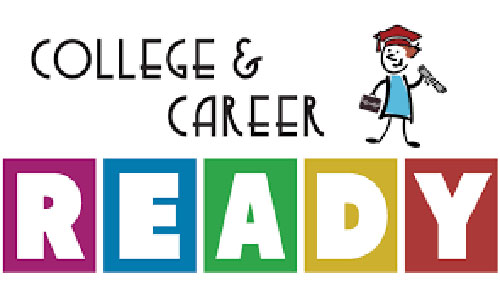
C&CR VISION & GOALS
We are committed to ensuring that our students are prepared to pursue a fulfilling career sparked by their P.A.T.H:
P Passion (Interests)
A Attitude (Personality)
T Talents (Skills/Strengths)
H Heart (Values/Beliefs)
We believe that no matter what our students are planning to do after high school, they should be in a position to choose the college and career pathway that will lead to a successful life. We want to help students make their life vision and mission a reality...to plan their path, set goals, and map a course for success.
K-8 Career & College Readiness Key Components
- College Aspirations
- Academic Planning
- Enrichment and Extracurricular Engagement
- College & Career Exploration
- College & Career Assessments
- College Affordability Planning
College-Ready means to qualify for and succeed in entry-level, credit bearing college courses without the need for remedial coursework.
Career-Ready means to qualify for and succeed in post secondary job training or education necessary for their chosen career and/or transition into employment with quality work skills/work ethic that will result in a promising career.
Goals
- Provide individual College & Career Readiness counseling for every 5th-8th grade student.
- 6th/8th grade students will gain awareness of potential career paths with the use of a Decision-making Career Assessment.
- 6-8th grade students will learn more about the 16 national career clusters and career pathways available to them one day at John Glenn.
- 6-8th grade students will have opportunities to speak with employers from a variety of careers.
- 5-8th grade students will experience college, technical school, CTE program, and job-site visits.

Academic/Attendance Vision & Goals
We are committed to providing instruction focused on Executive Skills that will help 5th/6th students be more successful in the classroom.
Executive Function Skills taught in the classroom and in small groups:
- Time management skills
- Flexible Thinking
- Studying/Note taking skills
- Test Taking skills
- Project Management